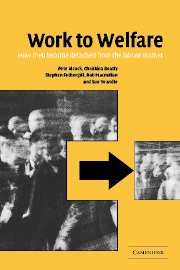Book contents
- Frontmatter
- Contents
- List of figures
- List of tables
- Notes on the authors
- Preface
- List of abbreviations
- Part I The context for labour market detachment
- Part II New evidence from the UK
- 4 The detached male workforce
- 5 Incapacity Benefit and unemployment
- 6 The over 50s
- 7 Family, life course and labour market detachment
- 8 The role of health in labour market detachment
- 9 Getting by
- 10 Back to work?
- Part III The policy implications
- Appendix: Research methodology
- References
- Index
8 - The role of health in labour market detachment
Published online by Cambridge University Press: 22 September 2009
- Frontmatter
- Contents
- List of figures
- List of tables
- Notes on the authors
- Preface
- List of abbreviations
- Part I The context for labour market detachment
- Part II New evidence from the UK
- 4 The detached male workforce
- 5 Incapacity Benefit and unemployment
- 6 The over 50s
- 7 Family, life course and labour market detachment
- 8 The role of health in labour market detachment
- 9 Getting by
- 10 Back to work?
- Part III The policy implications
- Appendix: Research methodology
- References
- Index
Summary
Earlier chapters have already described some of the ways in which men's labour market behaviour has altered in recent decades in response to a variety of changes in the occupational and industrial structure, family roles, access to welfare, pensions and education and new forms of work organisation. We have seen that for many men, especially, but not exclusively, those in the older age groups described in detail in ch. 6, detachment from the labour force has arisen through redundancy, early retirement or ill-health. Throughout the book, we have been exploring what ‘detachment from the labour market’ means. Chapter 1 outlined issues about measuring unemployment, noting that in the past standardised patterns of male employment partly disguised the measurement problems which are now so evident. Chapter 5 considered the extent to which men who would prefer to be working have disappeared from unemployment statistics because they have been recorded as economically inactive. Most commonly they have instead been defined as incapacitated (because they are claimants of IB) or as early retired (in some cases claiming no state benefits at all).
This chapter focuses specifically on the relationship between health and labour force detachment. It opens with discussion of some possible reasons for the increased claiming of sickness and disability benefits in recent decades. By 1999, when we conducted our last interviews, around 1.
- Type
- Chapter
- Information
- Work to WelfareHow Men Become Detached from the Labour Market, pp. 187 - 205Publisher: Cambridge University PressPrint publication year: 2003



